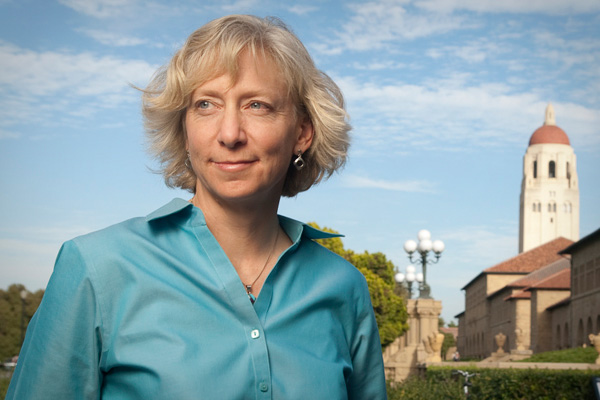Stanford biologist Gretchen Daily to receive 2010 Heinz Award for environmental achievement
Gretchen Daily, a professor of biology and senior fellow at Stanford's Woods Institute for the Environment, has been named one of 10 recipients of the 2010 Heinz Awards. In announcing the award, the Heinz Family Foundation cited Daily "for her innovative work to place a value on the services provided by natural ecosystems (clean air and water, food etc.), which has resulted in increasing momentum towards the conservation of the environment."
The annual awards, which total $1 million, were established in 1993 by Teresa Heinz, chairman of the foundation, to honor the memory of her late husband, Sen. John Heinz of Pennsylvania, who died in 1991. "The enormous financial benefits nature provides are often overlooked," Heinz said. "Dr. Daily calculates how economic and environmental interests line up, making a compelling case for preservation."
This year's awards "recognize individuals who are addressing global change caused by the impact of human activities and natural processes on the environment," the foundation said. In addition to an unrestricted award of $100,000, each recipient will be presented with a medallion at a ceremony on Nov. 15 in Washington, D.C.
Daily "has played a revolutionary role in developing theories on how land development can benefit both the people and the habitat of a region," the foundation said. "[She] has shown important and unique global leadership in advancing a new vision that harmonizes conservation and human development. Her work illuminates the many valuable benefits that flow from 'natural capital' – embodied in Earth's lands, waters and biodiversity – to supporting human wellbeing. Along with her research and environmental activism, Dr. Daily contributes to educating the next generation of scientists as a professor at Stanford University."
The foundation cited Daily's effort "to mainstream these values into resource decisions of people, governments and corporations" by co-founding the Natural Capital Project, a partnership of Stanford's Woods Institute, the University of Minnesota's Institute on the Environment, The Nature Conservancy and the World Wildlife Fund.
"In the past, the relationship between ecosystems and human prosperity has been easy to overlook," said Daily, co-director of the Natural Capital Project. "Nature was abundant and free. But with 7-plus billion people, nature can no longer sustain an all-you-can-eat buffet. It's time to realize our dependency on natural capital and make strategic investments in it."
As part of its mission, the Natural Capital Project has developed a computer software program called InVEST (Integrated Valuation of Ecosystem Services and Tradeoffs) that gives government officials, land owners and other decision-makers a systematic way to demonstrate the future costs and benefits of ecosystem services. "InVEST is being used in key policy decisions around the world, such as in China, where 25 percent of land is being zoned for conservation for the provision of flood control, hydropower production, water quality, biodiversity and other benefits," the foundation said.
The foundation noted that in 1997, Daily edited a collection of essays called Nature's Services outlining how ecosystems are generated, how humans affect them and how to maintain these services and human activity. That book "has served as a model for ecosystems regulation in several regions of the world and was a catalyst for the U.N.'s Millennium Ecosystem Assessment," the foundation added.


Share This Story